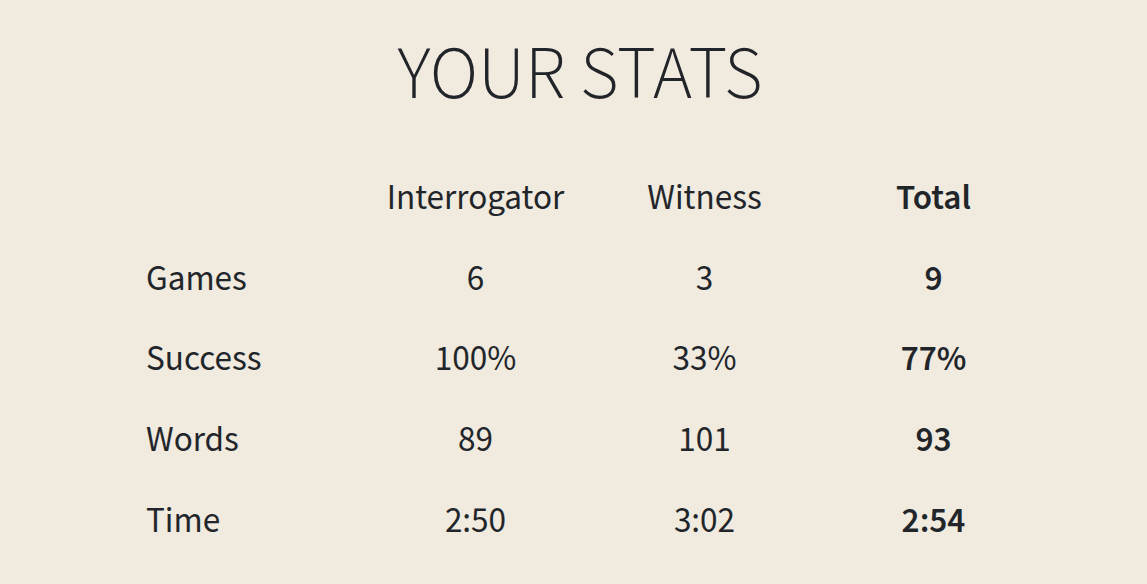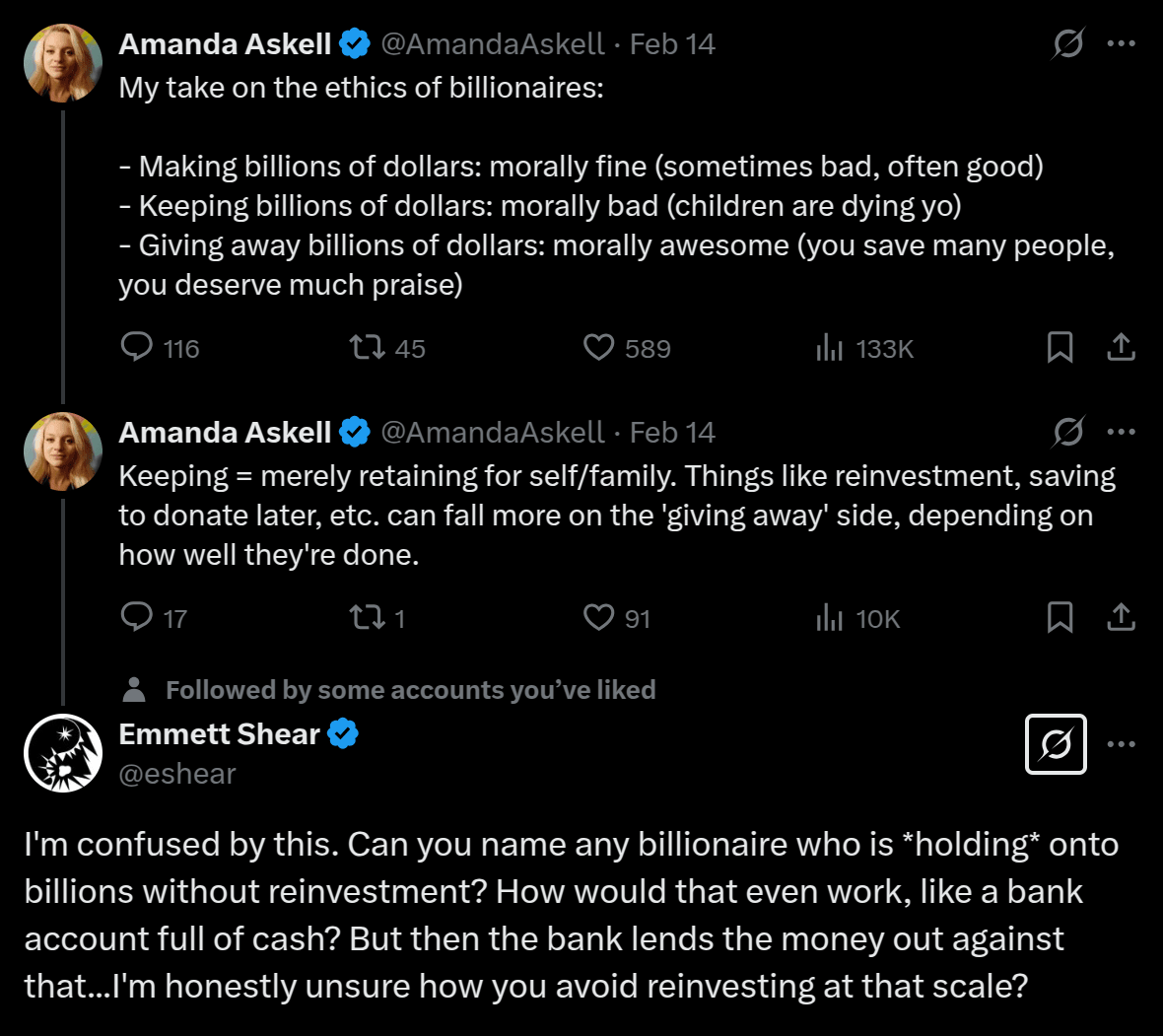AnonymousTurtle
Posts 6
Comments134
But I do really like that these researchers have put the test online for people to try!
Thanks for sharing, it's an interesting experience.
As you mention for now it's really easy to tell humans and AIs apart, but I found it surprisingly hard to convince people I was human.

I think a main argument related to that perspective is that you shouldn't tax wealth but you should tax consumption (holding billions in stocks and bonds has positive externalities, buying a yacht fleet has negative externalities)
I obviously don't agree with it, so I'm likely not presenting the strongest version of the arguments, but you can see an example of people holding this view in the twitter screenshot above, and I think it's not uncommon
Yes that's a fair point. Do you think the claim itself is false?
I was under the impression that many YMBY/Abundance/Progress Studies-minded EA communities were operating with that theory of change, am I wrong?
Thanks for replying with data. I think what matters for EA fundraising strategy is the relative share of wealth in the top 0.1% and in the top 1% (or maybe top 10%), it's great that the share of wealth in the bottom 50% is increasing, but I don't expect many there to be significant donors (with important but rare exceptions).
It's also not clear to me how liquid is the wealth in social insurance programs, I don't expect it to be a viable source of donations/influence/impact (but of course it's great that more people are covered by insurance)
I also think that I was mistaken to mention "the last decades", as "the last 5-10 years" seems a more relevant time frame for changes in EA strategy.
In my opinion the perception that inequality is increasing could also be due to relative comparisons between the top 1%-10% and the top 0.1%-0.01%, as the former becomes relatively less influential.
Another random anecdote: I was reading the Wikipedia page of an ultramarathon runner, and apparently her father is a famous mathematician
I don't find it concerning at all.
People who don't come from privileged backgrounds (e.g. the 700 million people living on less of $2.15/day) don't have the resources to worry about helping others effectively, the vast majority doesn't speak English, and so on.
Random anecdote: I'm in a hospital for a minor visit right now, and I don't find it concerning at all that many doctors here are likely to be from privileged backgrounds
I think looking at the top 1% is a bit misleading, as the top 0.1% and the top 1% had very different growth rates in the last decades.
If the relative amount of wealth in the top 0.1% increases compared to the top 1%, it makes sense for EA to prioritize more the former (assuming constant relative tractability)
The School For Moral Ambition is hiring people to work on Tax Fairness!
There are also several orgs working on UHNWI advising/fundraising.
In theory, if we could move from these people donating say 3% of their wealth, to say 20%, I suspect that could unlock enormous global wins. Dramatically more than anything EA has achieved so far. [...] in fairness, I think there was little dedicated and smart effort to improve it.
20% would be absurd, but even moving the average from 3% to 3.5% would be more than anything EA has achieved so far. But there are millions of people with strong incentives to do so (including every single charity relying on donations), so it would be surprising for EA to have such a huge effect. I'm glad that many people are trying and I hope that they succeed.
Possibly a tangential point, but lots of people in many EA communities think that accelerating economic growth in the US is a top use of funds. Billionaires don't hoard wealth, but they invest it in companies and lend it to governments.

Perhaps advocating for higher taxes on extreme luxury goods (e.g. yacht fleets and luxury private jets), if done in a tractable way, could get more universal traction.
10 years ago, I assumed that as word got out about effective giving, many more rich people would start doing that.
In terms of giving more, I don't understand why you would assume that. I imagine that billionaires could always see that there was a huge number of people that they could have helped relatively cheaply. I wouldn't expect changing the effectiveness by a couple of orders of magnitude to change things much. A typical GiveDirectly donor is closer to a typical GiveDirectly beneficiary than to a 10-billionaire, even on a log scale of income. In terms of giving more effectively, GiveWell recently commissioned a report to explore why other funders don't fund opportunities GiveWell does, but they haven't published it yet. (I imagine because of everything going on with USAID right now)
Surprising compared to what reference class? It's true that Peter Singer came from an accomplished family (his maternal grandfather has a Wikipedia page) and apparently William MacAskill went to private school, but I don't know how rare this is for somewhat influential philosophy professors in prestigious universities.
If you replaced "EA researchers" in your quick-take with "professors" or even "researchers", I think it would still be true. (At least for some definition of "surprising")
I believe the nonprofit world attracts people with financial security. While compensation is often modest, the work can offer significant prestige and personal fulfillment.
For what it's worth, I think EA is absolutely non-representative of the non-profit world, salaries in EA are higher than average salaries. I know several people who make more in their EA role than they made in their previous role, and there are many EA people working in AI making tons of money.
Do you expect that the median employee at The Salvation Army comes from a wealthy family?
But the most obvious implication to me, for people in this community, is to realize that it's very difficult to access how impressive specific individual EAs/nonprofit people are, without understanding their full personal situations. Many prominent community members have reached their positions through a combination of merit, family/social networks, and fortunate life circumstances.
I'm curious why is it important for people in your EA community to assess how impressive someone is? Do you mean for hiring decisions? I think anyone anywhere has reached their position through a combination of merit, family/social networks, and fortunate life circumstances.

By that definition, ELIZA would have passed the Turing test in 1966